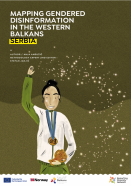MAPPING GENDERED DISINFORMATION IN THE WESTERN BALKANS – SERBIA
May 21, 2025
In July 2024, an assassination attempt on U.S. President Donald Trump in Pennsylvania quickly made global news. In Serbia, instead of focusing on the political implications or security breaches, tabloids and online portals used this opportunity to claim women were “unfit” to be a part of Trump’s security team as criticism of Secret Service failures was directed at the fact that some of the agents present were women who “did not cope well”. The portal of the daily tabloid Informer ran the sensational headline “Look who the US Secret Service sent to protect Trump”, suggesting that women being a part of the security team was scandalous.
This narrative quickly gained traction across multiple media outlets, reinforcing deeply ingrained gender stereotypes. Speculations that women were too emotional, too slow, or simply “unfit” for the job followed, raising doubts about whether women should be entrusted with protecting high-ranking political figures. While the actions of women agents were analysed in detail, the steps that male agents took were not examined, nor were they used to support claims that their gender determines their professional capabilities.
This case exemplifies how gendered disinformation operates. Targeting women by distorting facts, reinforcing gender norms, and weaponising harmful narratives through media manipulation. The “disinformation” in gendered disinformation refers not only to outright fabrications but also to a broader spectrum of information disorders, including misleading and manipulative content designed to undermine gender equality. Apart from women, gendered disinformation often targets gender minorities and the LGBTIQ+ community in general, intertwining sexism, misogyny, homophobia, and transphobia.

Download MAPPING GENDERED DISINFORMATION IN THE WESTERN BALKANS - SERBIA
